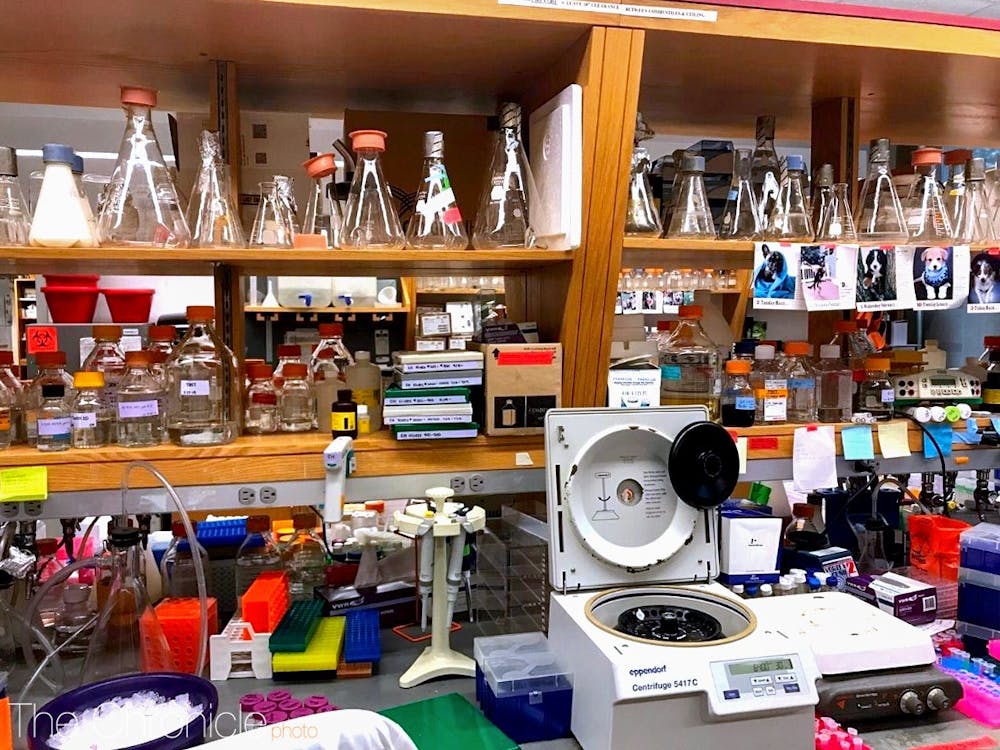While the March 13 email subject line, “Stay-in-place for Duke Undergraduate students” was a jolt to every student, it was particularly disconcerting for some who are conducting lab research under pressing deadlines.
While many students lamented the loss of daily activities such as studying on Bryan Center Plaza or getting coffee with their peers, others were experiencing acute anxiety over disruption of their academic schedules.
A senior named Megan, who asked that her last name be omitted so her experience did not reflect on the specific lab she works for, has been working in a lab since the second semester of her first year, and she has been toiling over her senior thesis project for two years.
“I’ve been doing research at Duke for three years, and I only have a month left to essentially wrap up everything I’ve been working on. Manuscript, thesis, the whole shebang,” Megan said.
To her dismay, she received the email regarding the stay-in-place order while working in the lab over the weekend. “For a lot of my experiments, I had to throw out a bunch of cells, and my [principal investigator] and other lab members had to terminate a lot of my experiments because I wouldn’t be able to go in during the following week,” she said.
She noted that, with her professor’s oversight, she was originally planning to send off a manuscript of her lab research for formal publication by the end of March. However, this projected publication date has since been deferred due to the lockdown. She is also drafting a senior thesis based on her lab research, and said that the stay-in-place order has postponed the final day of data collection that she would’ve included in her thesis.
Megan works in the lab for approximately 25 to 30 hours a week, but her schedule is contingent on her exams and classwork. She speculated that with the lockdown, her typical lab schedule would be delayed up to two or three weeks, because a substantial amount of her lab time is devoted to optimizing the experiments she is carrying out.
First-year Joanna Peng was in the midst of conducting biomedical lab research under a graduate student when the administration enforced the stay-in-place order.
“Normally each week, I’ll spend about eight hours or so in person and about two weeks ago, I started my first experiment,” said Peng. “I’ve been working in this lab area since May 2020, right when I was accepted to Duke.”
Although she began her lab work remotely with a coding project, she was finally able to transition to in-person lab work a couple weeks ago.
At the outset, Peng had been preparing fiberglass cells for treatment, culturing the cells in order to arrange them for her upcoming experiments. While she was initially scheduled to perform the experiment herself, after the lockdown announcement, her graduate student supervisor had to perform all of the work on her behalf.
“This was disappointing for me because I was excited to, you know, do my first experiment and I felt bad because my graduate student had to pick up and do all the work, while it would have been really great practice for me,” Peng said.
Peng noted that, while she experienced a relatively minor disruption, her Blue Devil Buddy, who is conducting lab research within the Pratt School of Engineering and is working on a senior thesis, was more severely affected.
“She had her COVID vaccine scheduled for next week, but she had to cancel it because it was a 40-minute drive away, and she would’ve had to quarantine for another week after the test, which would mean missing two weeks of lab instead of one because of the stay-in-place order,” Peng said.
Rebecca Simmons, associate professor of the practice in the department of mechanical engineering and materials science, is currently teaching several sections of design engineering labs. Although her own students’ work has not been adversely affected by the lockdown, her husband, Neal Simmons—Gendell Family professor of the practice of mechanical engineering and materials sciences—is teaching a senior design mechanical engineering class in which students’ timelines have been dismantled by the stay-in-place order.
“For him it was much more difficult, because this is the part of the semester where it’s really critical that the students can get into the design lab and work spaces in order to be working on building and testing,” Simmons said.
To alleviate her students’ social and academic anxiety during the lockdown, Simmons scheduled Zoom dinners with her classes as spaces for decompression and interaction away from the rigor of the classroom environment.
“For my 121 class, I said, ‘Let’s just do a non-class Zoom. We’re not gonna talk about class stuff, but, let’s just Zoom for everyone who’s interested, if you want to grab dinner’ ... and so we had about a dozen students, and some upperclassmen joined them, and that was fun.” Simmons said.
Editor's note: This story was updated to remove the last name of a source who understood it would be omitted from the story on initial publication.
Correction: This story has been updated to reflect that one student spends much of her time in a lab optimizing experiments, not redoing them. The Chronicle regrets the error.
Get The Chronicle straight to your inbox
Sign up for our weekly newsletter. Cancel at any time.
Halle Friedman is a Trinity senior and an associate news editor of The Chronicle's 119th volume.

